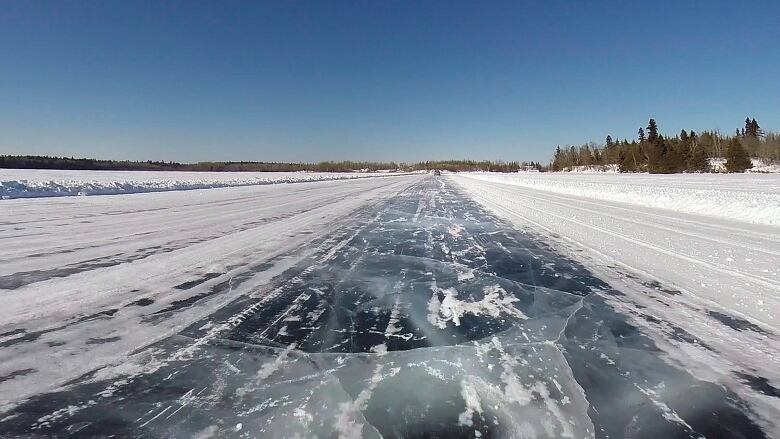Remote Manitoba First Nations declare state of emergency due to lack of winter road access
Chiefs say they're not able to bring in hundreds of loads of essential supplies

The chiefs of four isolated First Nations in northeastern Manitoba say this year's unusually warm weather has made it impossible to bring in hundreds of loads of essential supplies to their communities, via the province's winter road system.
At a news conference Tuesday morning, the chiefs from the Island Lake region which is comprised of the Wasagamack, St. Theresa Point, Red Sucker Lake and Garden Hill First Nations said they are declaring a state of emergency as a result.
The chiefs say many of the roads have not opened because the ground isn't frozen, while others have been damaged by rain and heavy trucks.
In Garden Hill, Chief Charles Knott said the situation has become so dire that they haven't been able to get any loads of supplies in this year, and only have about a week left of fuel.
"I don't know what we're gonna do if we run out," he said.
Knott said the First Nation's school might have to temporarily close down if they can't get the fuel that they need.
The chiefs ofWasagamack, St. Theresa Point and Red Sucker Lake said they're also waiting on food, fuel,medical supplies and building materials.
Cathy Merrick, grand chief of the Assembly of Manitoba Chiefs, said the absence of reliable road access is not only impacting the cost of goods in these communities but threatens to impact food security and access to health care if supplies can't be brought in.
She called on the provincial and federal governments to act immediately.
"They can no longer wait when it rains in February in this province. They need the help, they need the assistance now," Merrick said.
WATCH | AMC Grand Chief says reliable road access critical for remote First Nations:
Winter roads more difficult to maintain
The state of emergency declaration comes less than a week after the First Nations put forth a proposal for an all-season road they say is urgently needed as climate change threatens the current winter road system their communities rely on.
At that news conference, some expressed concerns that communities may have to have supplies airlifted in.
Vincent Simmsof Red Sucker Lake First Nation has spent years constructing and maintaining winter roads in the region. He said it's becomingmore difficultto build them, and they've been openinglater and later each year due to the warming climate.
This year, it's been particularly challenging, he said, adding that northern Manitoba has been experiencing the same warm winter weather that the rest of the province has.
"We need snow to construct our roads, which we do not have up north," he said.
"We're battling with open water that does not want to freeze. How do we fixthat problem?"
WATCH | Road foreman on how warming climate impacts winter road system:
Ian Bushie,Manitoba's minister of municipal and northern relations,he hopes to meet with federal officials and First Nations leaders as soon as possible to look at how to get goods and services into communities affected by winter road closures.
"Our hope is weget a little bit colder weather and we can get a large majority, if not all, of the loads into the communities and if not then we can have those conversations as it arises," he said.
After Tuesday morning's news conference, Bushie met with Keewatin Tribal Council Grand Chief Walter Wastesicoot, the federal government and other leaders to discuss the issue of winter roads.
Bushie told CBCthe province has been incontinuous discussions with affected communities andis looking to partner and advocate for First Nations in terms of federal responsibilities when it comes to winter roads.
After the meeting, Wastesicoot saidassurances were made by both levels of government thataffected First Nations will get theiressential supplies. He said different strategies to address any further deterioration of winter roads were also discussedat the meeting.
"We have to start lining up supports," Wastesicoot said. "We are going to be working to push the all-season roads."
A spokesperson for Indigenous Services Canada said they areaware of the state of emergencyandare workingwith communities in northern regions to construct theremaining winter roads.
In an emailed statement to CBC, the spokesperson said ISC is also open to working closely on long-term plans with provinces and communities that want to build all-seasonroads.
"We will do what it takes every year to make sure the delivery of essential supplies is uninterrupted and impacted communities have what they need at all times," the statement said.















_(720p).jpg)


 OFFICIAL HD MUSIC VIDEO.jpg)
.jpg)



























































































